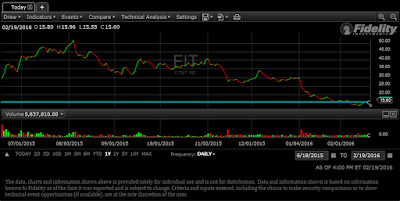 |
| Amazon.com is gaining as e-commerce continues to steal share |
- Amazon.com shares have led stocks in recovery this fall and for good reason.
- Consumer sentiment and spending data indicate Americans are still sanguine about shopping.
- Yet, Wal-Mart’s (NYSE: WMT) recent forecast changes show the nation’s leading brick-and-mortar discount retailer is in need of renovation.
- Amazon looks to be to blame for that, as the most recent quarterly e-commerce data showed internet retailers are still stealing market share from brick and mortar stores.
 Our founder earned clients a 23% average annual return over five years as a stock analyst on Wall Street. "The Greek" has written for institutional newsletters, Businessweek, Real Money, Seeking Alpha and others, while also appearing across TV and radio. While writing for Wall Street Greek, Mr. Kaminis presciently warned of the financial crisis.
Our founder earned clients a 23% average annual return over five years as a stock analyst on Wall Street. "The Greek" has written for institutional newsletters, Businessweek, Real Money, Seeking Alpha and others, while also appearing across TV and radio. While writing for Wall Street Greek, Mr. Kaminis presciently warned of the financial crisis.
Amazon.com (Nasdaq: AMZN) reports its earnings after the market close on Thursday October 22nd. Given the volatility of stocks since mid-August, and the market-moving report of one major retailer last week, there might be some trepidation around the stock’s future. But rest assured dear holders of AMZN, as the rise in the shares of the leading e-commerce player to their 52-week high looks warranted.
Amazon.com (Nasdaq: AMZN) shares have marked their 52-week high in recent trading and have led the broader market in its recovery since the mid-August mayhem and September swoon seen in the charts above. You can see that the PowerShares QQQ (Nasdaq: QQQ), which tracks the NASDAQ-100, has yet to fully recover and the SPDR S&P 500 (NYSE: SPY) is lagging even further behind. AMZN’s superior performance is explainable.
First of all, American consumer sentiment rates solidly and consumer spending is growing robustly in the U.S. While Wal-Mart (NYSE: WMT) just shared disappointing news about its outlook, Amazon is actually partly to blame for that. The latest e-commerce sales data shows that internet retailers continue to steal market share from brick and mortar stores, and Amazon is the dominant player on the internet and generally speaking in retail these days.
Let’s Look at the Consumer
The
Reuters/University of Michigan Consumer Sentiment Index (reported last Friday) improved 4.9 points from the close of September to its mid-October reading at 92.1. The current conditions component, which is the best take of how consumers feel today, jumped over 5.5 points to 106.7. Investors weary due to the latest monthly Employment Situation data should find solace in this news, as it is impacted by short-term changes in the labor market. Thus, it implies the job market data for October may be improved over September. However you look at it, this is good news for Amazon.com. The expectations component of this consumer measure was likewise improved, rising 4.5 points to 82.7.
According to the report and economists, this level of sentiment translates into roughly 4% annualized consumer spending growth. The improvement in sentiment likely reflects the improvement in the stock market, where a great deal of American wealth is stored, and also on low gasoline prices. When last measured,
personal spending showed solid 0.4% growth in August, month-to-month, matching the same gain for July. So, thus far, despite the issues overseas and in the U.S. domestic energy sector, Americans are still spending and have an improving appetite for it. It’s all good news for America’s dominant e-commerce discounter.
Wal-Mart’s Woes
Some (especially WMT holders) expressed consternation when America’s largest retailer, Wal-Mart (NYSE: WMT)
reported distressing guidance last week. The company’s shares plummeted when it revised lower its fiscal 2017 (Jan.) operating forecasts due to planned increases in staffing and wages. And it said one more thing: Wal-Mart indicated it would be investing heavily in e-commerce.
As you can see via the charts here, the news that Wal-Mart would be beefing up its e-commerce effort hardly frightened AMZN holders. While, AMZN did slide in concert with WMT, it was hardly a meaningful amount and lasted less than a day. That is because Wal-Mart’s news said more about what Amazon is doing right than about what Wal-Mart is hoping will help it compete better.
Ecommerce is Still Stealing Share
E-commerce sales continue to grow at a healthy pace. The good news you already knew about e-commerce was repeated in August by the U.S. Census Bureau, which published its
Quarterly E-Commerce Report (pdf format). Amazon.com is the nation’s leading internet e-commerce player by far, and so the data is clearly relevant to it.
The U.S. Census Bureau reported that retail e-commerce sales increased 4.2% in the second quarter of 2015 against the immediately preceding period. That is rapid growth for an entire industry to manage, and it is an industry that has now been around for awhile. Total retail sales only managed 1.6% growth for the same period, and that figure was significantly lifted by the e-commerce portion headed by Amazon. Against the prior year period, e-commerce sales soared 14.1% while total retail sales increased 1.0% for the same period. And more bad news for Wal-Mart and good news for Amazon.com is that e-commerce sales still only account for just 7.2% of total sales. The segment accounted for just 6.3% in last year’s quarter, so it is gaining fast. Yet, the low percentage of total sales still implies that e-commerce growth and market share gains will continue for the foreseeable future.
With room to grow, Amazon, the dominant player in the e-commerce segment, stands to keep stealing share from the likes of Wal-Mart. So, given the good news about the consumer and the good news about e-commerce, we are looking forward to Amazon’s future.
Please see our disclosures at the Wall Street Greek website and author bio pages found there. This article and website in no way offers or represents financial or investment advice. Information is provided for entertainment purposes only.
Labels: AMZN, Editors_Picks, Editors-Picks-2015-Q4, Stocks, Stocks-2015-Q4

















































